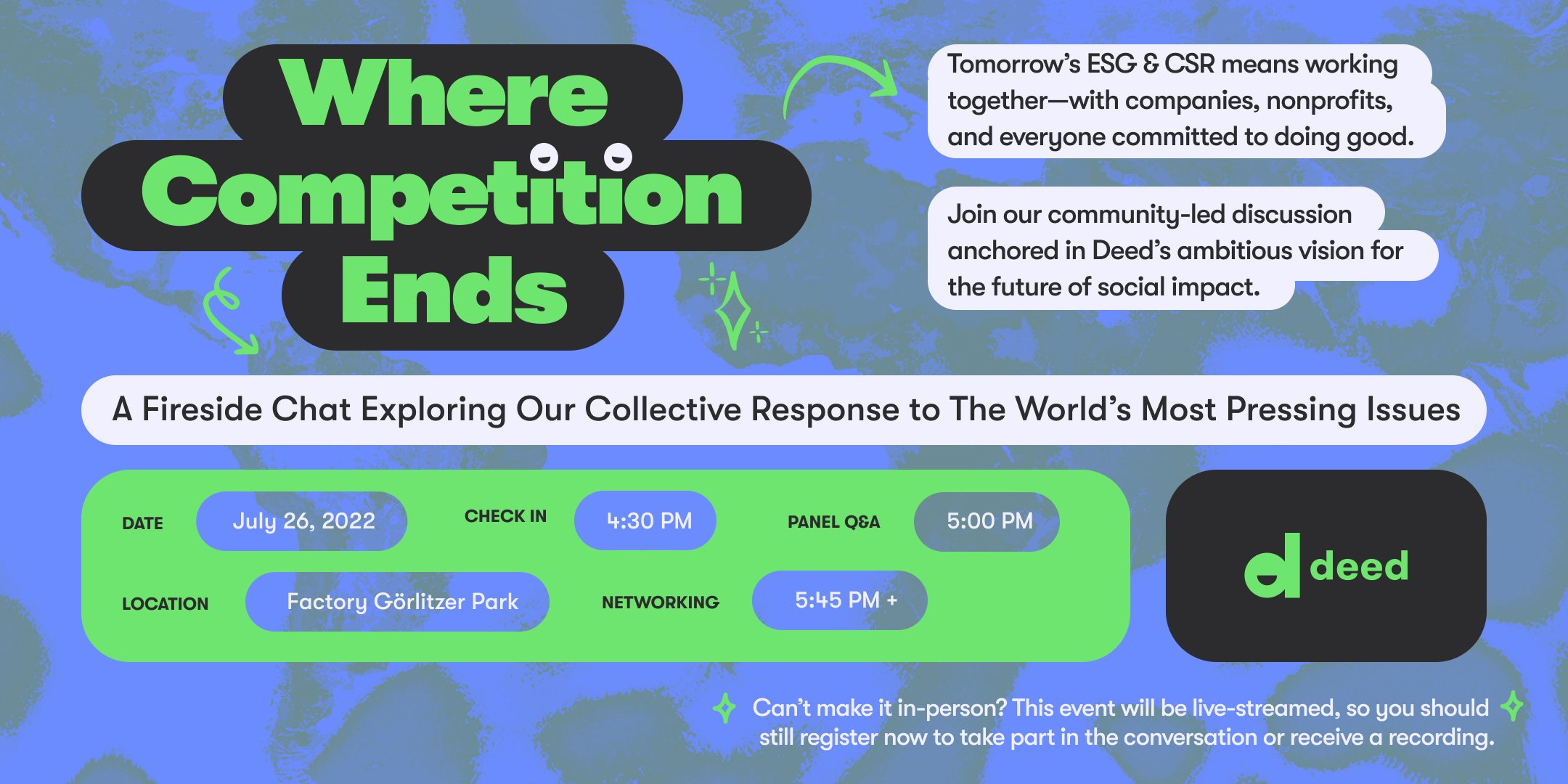Three Memorable Quotes from “Where Competition Ends”
On July 26, Deed hosted an expert panel with social impact leaders from Airbnb, o9 Solutions, and Kyndryl.
INTRODUCTION
Deed recently held our first-ever company-wide retreat at our Berlin headquarters. The crown jewel of the week’s events—which included team presentations, brand workshops, and even canoeing along the Spree—was a fascinating expert panel, moderated by Co-Founder & CEO Deevee Kashi, titled “Where Competition Ends: A Roundtable Exploring Our Collective Response to the World’s Most Pressing Issues.” (ICYMI, here’s the video.)
This was the first discussion of its kind in the sense that companies already making a major impact—including Airbnb, o9 Solutions, and Kyndryl—were given a public platform to brainstorm how they might work together to meet and hopefully exceed their ambitious ESG goals.
We are so grateful to Kate Walsh (Airbnb), Carlos Cuyás (o9 Solutions), and Dominic Nolan (Kyndryl) for sharing this vision. And we hope you were able to attend in-person or online, too. We’re still buzzing with excitement following the discussion. So even if you couldn’t make it, or if you’re thinking through how to implement some of the great ideas pitched that night in your program, here are three key insights from “Where Competition Ends.”
“People don’t follow companies. People follow people.”
Carlos Cuyás, o9 Solutions, on leadership buy-in
It was important to the many founders, executives, CSR team leaders, and employees in the audience that Cuyás made this point about leadership buy-in, especially as he shared more about how much ESG has benefitted o9 Solutions’ employee engagement, and business overall.
As we aim to democratize our programs, empowering our employees to choose what causes to dedicate their time, energy, money, and voices to, we risk losing sight of how important it is for management to be proactive changemakers. We can and must do both at once.
Remember: “Without [leadership buy-in],” as Cuyás said, “our communities, our programs, would not survive.”
“Every single customer that wants to work with us wants us to show that we’ve got a commitment to the climate, and to the journey to NetZero.”
Dominic Nolan, Kyndryl, on competitive advantage
Nolan’s point is so interesting because it lends itself to two interpretations. First, taken as an anecdotal market research, it shows the demonstrable competitive advantage to authentic CSR that works toward meeting ESG milestones.
But we could also take this point as a reflection on how the relationship between customers and businesses—even between businesses and one another—is evolving.
Rather than the traditional understanding that businesses make transactions with customers and compete with one another, Nolan’s point sheds some light on the fact that we can form broad communities and coalitions around shared causes, like combating climate change.
“Spending time with the data, understanding habits in a more tangible way, then bringing out those stories is the most important thing for inspiring that changemaking behavior.”
Kate Walsh, Airbnb, on social impact storytelling
The panel agreed that even companies who are reaching major ESG milestones struggle to transform their impact into a powerful, overarching brand narrative. Airbnb is a beacon to those trying to tell a different, more effective kind of story.
“This is related to what I was saying about moving away from traditional CSR,” Kate Walsh said about Airbnb’s approach to storytelling. Walsh went on:
When you think about reporting metrics, for example, you can measure the number of donations or the amount of donations. But actually, out of context, I don’t know what that means for your average employee. So we’re really looking to source the stories from within our community to make everyone aware that they’re part of this community of changemakers—and that they themselves have a changemaker within them.
Companies are increasingly following Airbnb’s lead on this. It’s an interesting question: How can we best share with the market our conviction that the world is a better place with our companies in it?
By the way: We just launched “Social Impact Storytelling,” a new blog series. In it, Deed’s head of marketing, Guillermo Murga, shows you how to align purpose with productivity in your brand, with lessons from incredible companies like Airbnb, Box, and adidas. If you haven’t read it already, check out the first installment, which covers how to write a winning year-end social impact report. The year-end report is one of the first places
BEHIND THE SCENES: WHY WE HOSTED THIS PANEL
During the Q&A, Kyndryl’s Dominic Nolan shared a salient piece of advice:
“You’ve got to do something, basically. You can’t take too long trying to work out what you’re going to do. Listen, then get something done,” Dominic said. “That’s why Deed was really good. Within three months the platform launched.“
This gets at the heart of why we organized this panel in the first place. We believe that our Deed community can make a tangible difference in the world by working together on issues from climate change to extreme poverty and world hunger.
We are humbled to work alongside Dominic and Kyndryl. So many corporate leaders are keen to take responsibility for their own communities in this fight—what they need is a nimble, empathetic, and collaborative partner to help them steer from behind.
If that resonates with you as much as it does for Dominic—and impact leaders from adidas to Box—then we’d love to hear from you.
CONCLUSION
We cannot reasonably expect to address the immense scale of such escalating issues as climate change, extreme poverty, and hunger by siloing our efforts. The world’s most vulnerable demand cooperation on a global scale, focused on improving the quality of life—every life.
And the business case is clear. Consumers expect companies to publicly acknowledge and authentically address ESG challenges, from carbon emissions to the wage gap. Employees, in turn, are looking to their employers for help including meaningful work in their vision for a more fulfilling life.
We need a stronger sense of corporate social responsibility, which includes a totally new approach to employee engagement. That means starting with the right priorities this time: doing well in business by doing good for the world.
Up for the challenge? Book a demo today.

